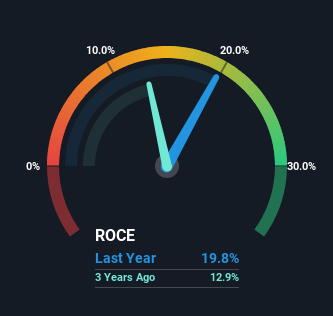- India
- /
- Construction
- /
- NSEI:NCC
Investors Shouldn't Overlook The Favourable Returns On Capital At NCC (NSE:NCC)

If we want to find a potential multi-bagger, often there are underlying trends that can provide clues. In a perfect world, we'd like to see a company investing more capital into its business and ideally the returns earned from that capital are also increasing. If you see this, it typically means it's a company with a great business model and plenty of profitable reinvestment opportunities. Ergo, when we looked at the ROCE trends at NCC (NSE:NCC), we liked what we saw.
Return On Capital Employed (ROCE): What Is It?
Just to clarify if you're unsure, ROCE is a metric for evaluating how much pre-tax income (in percentage terms) a company earns on the capital invested in its business. Analysts use this formula to calculate it for NCC:
Return on Capital Employed = Earnings Before Interest and Tax (EBIT) ÷ (Total Assets - Current Liabilities)
0.20 = ₹13b ÷ (₹176b - ₹108b) (Based on the trailing twelve months to September 2023).
So, NCC has an ROCE of 20%. In absolute terms that's a great return and it's even better than the Construction industry average of 13%.
Check out our latest analysis for NCC

Above you can see how the current ROCE for NCC compares to its prior returns on capital, but there's only so much you can tell from the past. If you're interested, you can view the analysts predictions in our free report on analyst forecasts for the company.
So How Is NCC's ROCE Trending?
We'd be pretty happy with returns on capital like NCC. Over the past five years, ROCE has remained relatively flat at around 20% and the business has deployed 27% more capital into its operations. With returns that high, it's great that the business can continually reinvest its money at such appealing rates of return. If these trends can continue, it wouldn't surprise us if the company became a multi-bagger.
On a side note, NCC's current liabilities are still rather high at 61% of total assets. This can bring about some risks because the company is basically operating with a rather large reliance on its suppliers or other sorts of short-term creditors. While it's not necessarily a bad thing, it can be beneficial if this ratio is lower.
The Bottom Line On NCC's ROCE
In short, we'd argue NCC has the makings of a multi-bagger since its been able to compound its capital at very profitable rates of return. And the stock has followed suit returning a meaningful 95% to shareholders over the last five years. So even though the stock might be more "expensive" than it was before, we think the strong fundamentals warrant this stock for further research.
If you'd like to know about the risks facing NCC, we've discovered 1 warning sign that you should be aware of.
If you want to search for more stocks that have been earning high returns, check out this free list of stocks with solid balance sheets that are also earning high returns on equity.
Valuation is complex, but we're here to simplify it.
Discover if NCC might be undervalued or overvalued with our detailed analysis, featuring fair value estimates, potential risks, dividends, insider trades, and its financial condition.
Access Free AnalysisHave feedback on this article? Concerned about the content? Get in touch with us directly. Alternatively, email editorial-team (at) simplywallst.com.
This article by Simply Wall St is general in nature. We provide commentary based on historical data and analyst forecasts only using an unbiased methodology and our articles are not intended to be financial advice. It does not constitute a recommendation to buy or sell any stock, and does not take account of your objectives, or your financial situation. We aim to bring you long-term focused analysis driven by fundamental data. Note that our analysis may not factor in the latest price-sensitive company announcements or qualitative material. Simply Wall St has no position in any stocks mentioned.
About NSEI:NCC
Flawless balance sheet average dividend payer.
Similar Companies
Market Insights
Community Narratives




